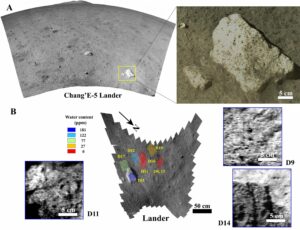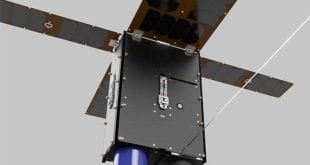
Edinburgh, 11 January 2022. – A research team led by Profs. Lin Yangting and Lin Honglei from the Institute of Geology and Geophysics of the Chinese Academy of Sciences (IGGCAS) observed water signals in Moon surface reflectance spectral data. The discovery is the first evidence of in-situ detection of water on our natural satellite.
The study was a joint project with the National Space Science Center of CAS, the University of Hawaii at Manoa, the Shanghai Institute of Technical Physics of CAS and Nanjing University.
The sample examined was acquired by the Chang’E-5 spacecraft that landed on one of the youngest mare basalts, in 2020. The lander returned 1,731 g of samples altogether. The onboard lunar mineralogical spectrometer performed spectral reflectance measurements of the regolith and of a rock at the landing site.
According to quantitative spectral analysis the soil at the site contains less than 120 ppm of water, due to solar wind. This is consistent with the preliminary analysis of the lunar samples returned by Chang’E-5.
Compositional and orbital remote sensing analyses reveal that the examined rock may have been ejected from an older basaltic unit. These results are consistent with the volcanic eruptions in the Procellarum KREEP (potassium, rare earth elements, phosphorus) region.




